|
|
|
Sort Order |
|
|
|
Items / Page
|
|
|
|
|
|
|
| Srl | Item |
| 1 |
ID:
168785
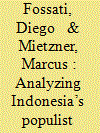

|
|
|
|
|
| Summary/Abstract |
Using original survey data, we test the level, distribution, and demographic patterns of populist attitudes in Indonesia. Populist attitudes are widely spread across the political spectrum; disproportionately high in the middle and upper classes; and particularly robust when coupled with other primary ideologies, such as Islamism and secularism.
|
|
|
|
|
|
|
|
|
|
|
|
|
|
|
|
| 2 |
ID:
146701
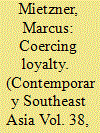

|
|
|
|
|
| Summary/Abstract |
Scholars of coalitional presidentialism have focused on the question of how presidents in multi-party systems manage to establish stable governments. Some authors have argued that in the case of Indonesia, post-authoritarian presidents have prioritized inclusivist alliance building, with all parties offered cabinet seats and other rewards in exchange for loyalty. However, as this article demonstrates, President Joko Widodo has opted for a more coercive approach: reactivating power tools not used since the days of Suharto’s autocracy, he intervened in the internal affairs of at least two opposition parties and eventually forced them to declare their support for his administration. This method, while designed to obstruct the anti-democratic agenda of the opposition, has in itself had detrimental effects on Indonesia’s democratic quality.
|
|
|
|
|
|
|
|
|
|
|
|
|
|
|
|
| 3 |
ID:
084538


|
|
|
| 4 |
ID:
121662
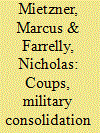

|
|
|
| 5 |
ID:
141907
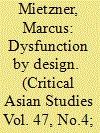

|
|
|
|
|
| Summary/Abstract |
Despite an ever-increasing number of arrests of elite politicians by Indonesia's anticorruption commission, the country's levels of political corruption remain stubbornly high. This article argues that the main reason for this apparent paradox is Indonesia's dysfunctional party and campaign financing system. None of the three elements upon which this system was built (membership dues, donations, and state subsidies) has worked to finance politics in an effective manner. This systemic failure is far from accidental: it is caused and perpetuated by an elite that prefers illicit fund-raising to the limitations that a more orderly funding mechanism would impose. As a result, political corruption continues unabated, oligarchs have penetrated party politics, and state budgets are misappropriated for political purposes. Indonesia's new president, Joko Widodo, has promised to reform the political finance regime, but the power of deeply entrenched interests groups means that any change will be painfully slow.
|
|
|
|
|
|
|
|
|
|
|
|
|
|
|
|
| 6 |
ID:
159536
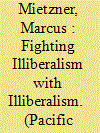

|
|
|
|
|
| Summary/Abstract |
The global rise of populist campaigns against democratic governments has revived the long-standing scholarly debate on how democracies can best defend themselves against anti-democratic challenges. While some view an aggressive militant democracy approach as the most effective option, others propose accommodation of populist actors and voters. Others again suggest a merging of the two paradigms. This article analyzes how the government of Indonesian President Jokowi has responded to the unprecedented Islamist-populist mobilization in the capital Jakarta in late 2016. Unsystematically mixing elements of all available options, Jokowi’s administration pursued a criminalization strategy against populists that violated established legal norms, and launched vaguely targeted but patronage-oriented accommodation policies. As a result, the government’s attempt to protect the democratic status quo from populist attacks turned into a threat to democracy itself. Indonesian democracy, I argue, is now in a slow but perceptible process of deconsolidation.
|
|
|
|
|
|
|
|
|
|
|
|
|
|
|
|
| 7 |
ID:
117068


|
|
|
|
|
| Publication |
2012.
|
| Summary/Abstract |
Most comparative theorists of democracy have described Asia's political parties as highly personalized, weakly rooted and ideologically hollow. Indonesia has not been exempted from this assessment, with many authors identifying parties as the weakest link in the country's young democracy. But a more systematic analysis of Indonesian parties offers a different perspective. This article uses analytical tools developed by Paul Webb and Stephen White to assess the popular legitimacy, organizational rootedness and systemic functionality of the Indonesian Democratic Party of Struggle. The discussion shows that, despite well known deficiencies, the party has a clearly defined constituency, possesses moderately strong roots in society and plays an important role in interest aggregation and articulation. Accordingly, this case study sheds a new light on deeply entrenched stereotypes of party politics in Asia and other transitional democracies.
|
|
|
|
|
|
|
|
|
|
|
|
|
|
|
|
| 8 |
ID:
086689
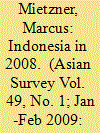

|
|
|
|
|
| Publication |
2009.
|
| Summary/Abstract |
Indonesia in 2008 presented an apparent paradox: despite generally strong political and economic performance indicators, the popularity of President Yudhoyono's government fluctuated wildly. As campaigning for the 2009 elections began, Yudhoyono's solid lead evaporated, although he recovered toward the end of 2008. The opposition, however, remains divided.
|
|
|
|
|
|
|
|
|
|
|
|
|
|
|
|
| 9 |
ID:
094492
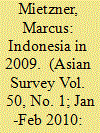

|
|
|
| 10 |
ID:
152256
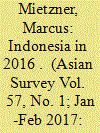

|
|
|
|
|
| Summary/Abstract |
During his second year in power, Indonesian President Joko Widodo faced contradictory yet interrelated trends: while he consolidated his grip over parliament and improved his approval ratings, the president’s remaining opponents shifted the focus of political contestation from the state’s institutions onto the streets. Additionally burdened by economic uncertainty and rising regional tensions over the South China Sea, Indonesian democracy thus continues to be vulnerable, its outward stability notwithstanding.
|
|
|
|
|
|
|
|
|
|
|
|
|
|
|
|
| 11 |
ID:
092331
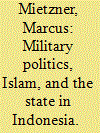

|
|
|
|
|
| Publication |
Singapore, ISEAS, 2009.
|
| Description |
xvi, 426p.
|
| Standard Number |
9789812307873
|
|
|
|
|
|
|
|
|
|
|
|
Copies: C:1/I:0,R:0,Q:0
Circulation
| Accession# | Call# | Current Location | Status | Policy | Location |
| 054600 | 355.0309598/MIE 054600 | Main | On Shelf | General | |
|
|
|
|
| 12 |
ID:
121668
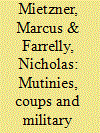

|
|
|
|
|
| Publication |
2013.
|
| Summary/Abstract |
Scholars of civil-military relations have long been puzzled by the fact that despite a series of mutinies, Papua New Guinea (PNG) has never seen a full-blown military takeover. Indeed, when PNG became independent in the early 1970s, some veteran PNG watchers had predicted that the country was likely to follow in the footsteps of many coup-prone African countries. In this article, the authors highlight the reasons for the surprising absence of coups in PNG by comparing the country to three South-East Asian nations that have experienced coups. By contrasting PNG with Indonesia, Burma and Thailand, the authors identify five key factors that have prevented coups in the former and facilitated them in the latter: first, the role that the military played in the struggle for independence or modern statehood; second, the size of the armed forces; third, the military's organisational capacity; fourth, geographical conditions and the military's command structure; and finally, the general relationship between civilian and military elites.
|
|
|
|
|
|
|
|
|
|
|
|
|
|
|
|
| 13 |
ID:
100265
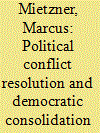

|
|
|
|
|
| Publication |
2010.
|
| Summary/Abstract |
This article argues that Indonesia's Constitutional Court has played a significant role in that country's transformation from a violence-prone polity into Southeast Asia's most stable democracy. The Court has advanced institutional conflict resolution mechanisms and expanded democratic rights-two achievements identified by Linz and Stepan as major indicators of a consolidating democracy. Building on models developed by Ginsburg and Horowitz, my analysis also illustrates why the Court has been able to defend its autonomy and become an agent of democratization. While sharing Ginsburg's emphasis on high levels of power diffusion as a key reason for the Court's success, this article moves beyond such an approach. Most importantly, it suggests that the judges' "judicial activism"-as expressed in a number of controversial but popular decision-increased Indonesian society's support for the Court to such an extent that is has now become largely invulnerable to attempts of external intervention.
|
|
|
|
|
|
|
|
|
|
|
|
|
|
|
|
| 14 |
ID:
141905


|
|
|
|
|
| Summary/Abstract |
The three articles in this themed collection investigate the interplay between political finance regimes and the quality of democracy in Southeast Asia. Andreas Ufen's piece on political finance in Malaysia and Singapore argues that the semi-authoritarian regimes in both states have blocked the reform of campaign and party funding regulations in order to keep their opposition in check. The article on Indonesia, authored by Marcus Mietzner, showcases the country's dysfunctional political finance system as a major hurdle toward further democratization. In their contribution on Thailand, Napisa Waitoolkiat and Paul Chambers show that weak political finance regulations have contributed significantly to the shallowness of Thai parties. Overall, the collection demonstrates that without meaningful political finance reforms, Southeast Asia's democratic stagnation is likely to persist for many years to come.
|
|
|
|
|
|
|
|
|
|
|
|
|
|
|
|
| 15 |
ID:
121665
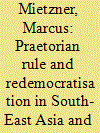

|
|
|
|
|
| Publication |
2013.
|
| Summary/Abstract |
Indonesia is an almost ideal case study to test a variety of explanatory propositions for the rise and fall of military regimes. Over the course of 50 years, Indonesia has witnessed a military takeover, the consolidation of praetorian rule, the toppling of a military-backed autocrat and the marginalisation of the armed forces from politics after democracy took hold. The analysis of these four periods delivers important insights into the conditions under which countries fall victim to military coups and subsequently fail or succeed in their efforts of redemocratisation. While historical, governmental, economic, international and military-internal factors are all at play, it is arguably the quality of civilian governance that has the greatest impact on a state's prospects of preventing military interventionism. In turn, the strength of civilian governments depends to a large extent on the existence of a solid democratic consensus against military rule; as the Indonesian case shows, the absence of such intra-civilian agreements delivers ample opportunities to military officers to meddle in political affairs.
|
|
|
|
|
|
|
|
|
|
|
|
|
|
|
|
| 16 |
ID:
173155
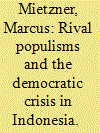

|
|
|
|
|
| Summary/Abstract |
Viewed as a stable democracy for much of the 2000s and early 2010s, Indonesia has in recent years been part of the global populist surge. In fact, national politics has been marked by competition between three rival populist streams: chauvinism, Islamism and technocratic developmentalism. This article discusses the conditions under which such a three-track populism could emerge in Indonesia. In identifying the drivers of populism, it points to the existence of a major religio-political cleavage, the framing of that cleavage in a narrative of economic inequality, the easy targeting of cultural minorities, and the collaboration of established parties. Drawing from survey data to substantiate its claims, the discussion demonstrates that populist attitudes are spread widely across the ideological landscape; that its intensity is highest at the extreme ends of Indonesia’s Islamist-pluralist spectrum; and that populist citizens are more concerned with purported threats to their identity than the kind of politico-economic hardship that much of the classic populism literature has focused on. Most importantly for Indonesian democracy, the three types of populism have interacted among each other, and with the non-populist political establishment, in a way that has severely undermined the quality of the democratic polity.
|
|
|
|
|
|
|
|
|
|
|
|
|
|
|
|
| 17 |
ID:
083122
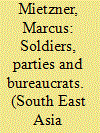

|
|
|
|
|
| Publication |
2008.
|
| Summary/Abstract |
This article discusses illicit fund-raising efforts in Indonesia's armed forces, political parties and bureaucracy after the fall of Suharto in 1998. It argues that while personal self-enrichment remains a key motivation for military leaders, party politicians and bureaucrats to collect off-budget funds, there are also other crucial factors. Most importantly, all three sectors aim to control independent funds in order to maintain or strengthen their autonomy from other state institutions, such as parliamentary budget commissions, executive monitoring bodies or official auditing boards. By engaging in extensive self-financing practices, however, the three political actors undermine their own professionalism, functional effectiveness and internal coherence, and obstruct Indonesia's process of democratic consolidation
|
|
|
|
|
|
|
|
|
|
|
|
|
|
|
|
| 18 |
ID:
148550
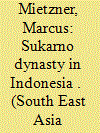

|
|
|
|
|
| Summary/Abstract |
This article focuses on the history and current political relevance of the Sukarno dynasty in Indonesia. It analyses the reasons for the political longevity of the family, but also discusses internal and external pressures that have forced the dynasty to adopt new strategies to secure its survival. The article tests a number of assertions that political theorists have typically made about dynasties and their political parties: for instance, that they are institutionally weak, electorally unstable and have low levels of representativeness. I argue that the Sukarno family has been able to mitigate most of these much-discussed deficits, but has faced a series of succession crises that, if unresolved, threaten its long-term position in Indonesian politics.
|
|
|
|
|
|
|
|
|
|
|
|
|
|
|
|
|
|
|
|
|